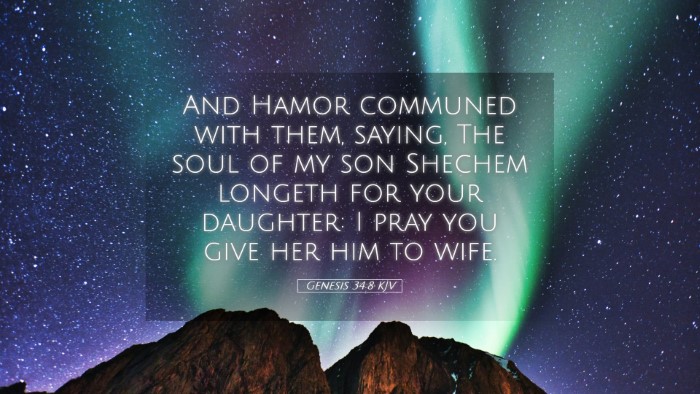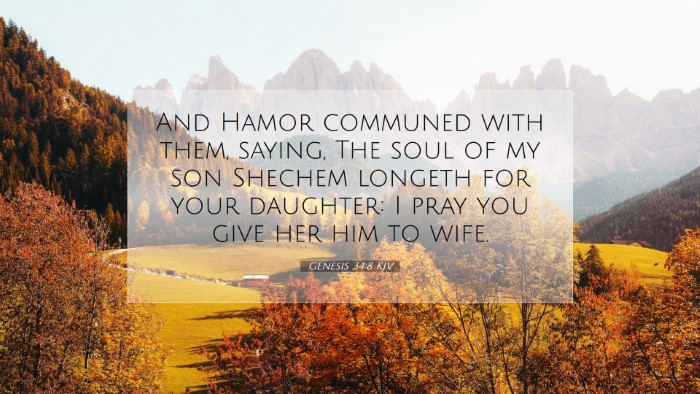Commentary on Genesis 34:8
This passage presents a poignant moment in the narrative of Jacob's family, showcasing the complexities of human relationships and the consequences of sin. The events surrounding Dinah, Jacob’s daughter, and Shechem highlight cultural, ethical, and social concerns that resonate throughout biblical history.
Contextual Overview
Genesis 34 narrates a troubling incident involving Dinah, the only daughter of Jacob and Leah, who goes out to see the daughters of the land and becomes involved with Shechem, the son of Hamor. After Shechem’s violation of Dinah, he desires to marry her, which sets off a series of events leading to great tragedy.
Key Themes
- The Role of Women: Dinah's story underscores the precarious position of women in ancient societies, where their honor and well-being were often subordinated to the interests of men.
- Cultural Integration and Conflict: The passage explores the tensions between the Israelites and the Canaanites, particularly as it pertains to marriage and societal practices.
- Revenge and Justice: Jacob's sons’ reaction signifies the deep wounds of familial loyalty and the ensuing cycles of violence that often characterize human relationships.
Insights from Commentators
Matthew Henry's Commentary
Matthew Henry stresses the significance of Dinah going out to see the daughters of the land, which illustrates the dangers of seeking companionship outside of the faith community. He provides deep reflection on the loss of virtue and the subsequent shame associated with Dinah's defilement. Henry insists that this incident points to the necessity of vigilance against the temptations that arise from cultural immersion.
Albert Barnes' Notes
Barnes highlights the diplomatic approach of Hamor, Shechem's father, in seeking to negotiate a marriage between Shechem and Dinah following the violation. He argues that this illustrates the cultural practices of the ancient Near East, where relations could be rectified by marriage. Barnes cautions readers about the dangers of simply conforming to cultural expectations without regard for divine law.
Adam Clarke's Commentary
Adam Clarke delves into the psychology of Shechem's desire for Dinah, asserting that true love should never emerge in the context of violation. He notes that Shechem's request for Dinah's hand represents a misguided understanding of love and commitment. Clarke also depicts Jacob’s reaction as passive, reflecting a difference in values compared to his sons, who took justice into their own hands.
Theological Implications
The theological ramifications of Genesis 34:8 are significant. The text challenges believers to grapple with themes of sin, repentance, and the quest for justice within a fallen world. It serves as a reminder that God’s covenant people must be set apart, reflecting His character and standards, particularly in their interpersonal relationships.
Practical Applications
- Guarding Against Compromise: Just as Dinah ventured into a foreign land, modern believers are called to be vigilant against the influences of secular culture that may compromise their values.
- Promoting Healthy Relationships: The story serves as an exhortation to nurture healthy, respectful relationships reflective of God’s design for purity and love.
- Understanding the Consequences of Sin: The fallout from Dinah’s situation shows how individual actions can ripple through families and communities, stressing the need for accountability and righteousness.
Conclusion
Genesis 34:8 stands as a complex narrative that invites deeper exploration of the challenges faced by God’s people amidst surrounding cultures. The commentaries of Matthew Henry, Albert Barnes, and Adam Clarke collectively provide a multidimensional view of the event, encouraging scholars and pastors alike to draw lessons from this historical account. As they reflect on the harm done, the need for justice, and the pursuit of righteousness, believers are called to navigate their faith with wisdom and integrity.


